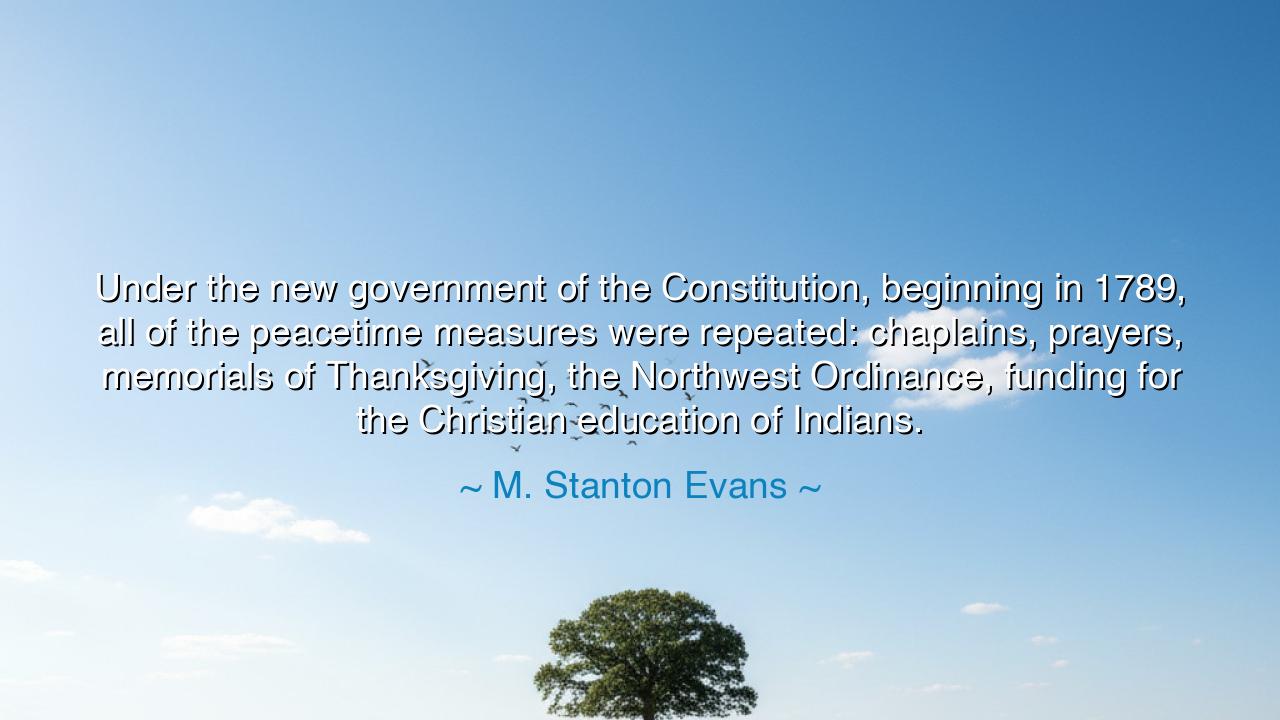
Under the new government of the Constitution, beginning in 1789
Under the new government of the Constitution, beginning in 1789, all of the peacetime measures were repeated: chaplains, prayers, memorials of Thanksgiving, the Northwest Ordinance, funding for the Christian education of Indians.






In the words of M. Stanton Evans: “Under the new government of the Constitution, beginning in 1789, all of the peacetime measures were repeated: chaplains, prayers, memorials of Thanksgiving, the Northwest Ordinance, funding for the Christian education of Indians.” These words remind us that the birth of the American republic did not sever itself from its spiritual roots, but instead carried forward traditions of reverence, gratitude, and moral instruction. In them lies the testimony that even as the nation embraced liberty and self-rule, it sought grounding in practices meant to shape the heart as much as the body of the people.
The ancients themselves would have recognized this pattern. For no enduring civilization has been built upon laws alone. Rome had her rituals, Athens her sacrifices, Israel her covenant feasts. A government cannot live by statutes and armies if it forgets the deeper soul of its people. Thus, when the framers of the Constitution began their work under this new order, they did not abandon the practices of prayer, thanksgiving, and moral instruction; they enshrined them anew, knowing that the strength of the state flows first from the character of its citizens.
Consider the Northwest Ordinance of 1787, reaffirmed under the Constitution. It did more than govern new lands; it declared that “religion, morality, and knowledge being necessary to good government and the happiness of mankind, schools and the means of education shall forever be encouraged.” Here is the wisdom Evans points to: that even in the march of expansion, the republic sought to weave faith and virtue into its foundation. It was not mere conquest of territory, but cultivation of character. Without such anchoring, the land itself would be barren, no matter how vast.
The memorials of Thanksgiving also speak profoundly. To pause as a nation, to acknowledge providence, to give thanks even in hardship, is not weakness but strength. The leaders of that early republic understood, as the ancients did, that gratitude binds people together more deeply than law. In times of trial, it lifts the spirit; in times of abundance, it tempers pride. By repeating this tradition under the new government, they ensured that liberty would not drift into arrogance, but remain humbled before the Giver of all blessings.
Even the appointment of chaplains and the preservation of prayers within public life show us a lesson. For the framers, faith was not a private whisper to be hidden, but a pillar of public strength. They believed that a republic, dependent upon virtue and self-restraint, required more than clever institutions—it required the steady reminder of transcendent accountability. Thus they appointed men of prayer to accompany them, as guardians not of law, but of conscience.
And though modern ears may bristle at the funding of Christian education for the Indians, it too reveals the mindset of that era: that education and faith were inseparable, that to uplift a people meant not only to teach them to read and govern, but to plant within them the moral compass of the age. We may judge differently today, yet we must not miss the deeper principle: they believed the flourishing of a nation required both knowledge and virtue, both liberty and discipline.
The lesson is clear: a republic cannot stand on parchment and power alone. It must be sustained by practices that shape the heart—gratitude, prayer, education, and reverence for higher truths. The framers, though imperfect men, understood that liberty without morality is license, and freedom without gratitude is ruin.
Practical action flows from this truth: preserve traditions that root your family, your community, and your nation in humility and moral strength. Celebrate Thanksgiving not as mere feasting, but as gratitude. Uphold education not only for knowledge, but for virtue. Let prayer or reflection steady your days, that freedom may not become arrogance. And remember that constitutions and governments are only as strong as the character of those who live under them.
Thus, Evans’s words echo across the centuries: the founders of America, in 1789, built not only a government but a culture. They knew that laws order the hands, but traditions order the heart. And only when both are preserved can a people remain free, enduring, and strong.






AAdministratorAdministrator
Welcome, honored guests. Please leave a comment, we will respond soon